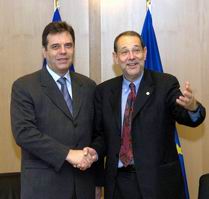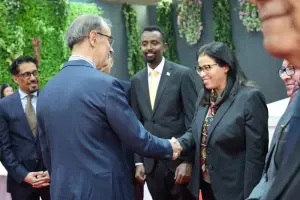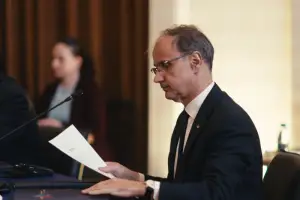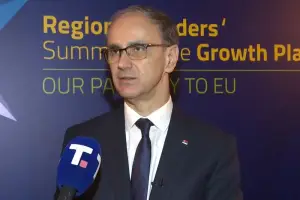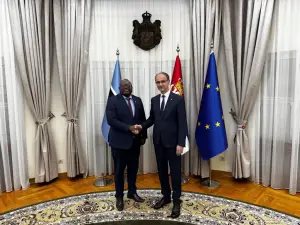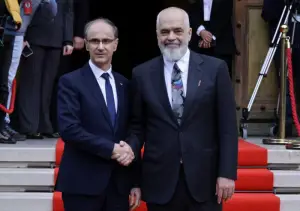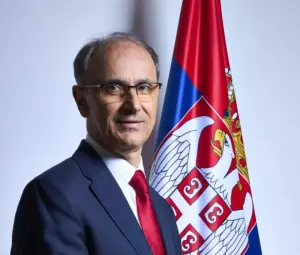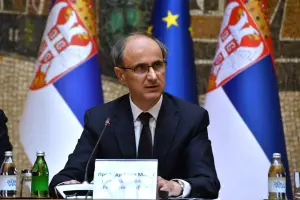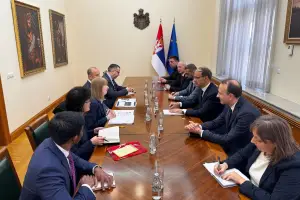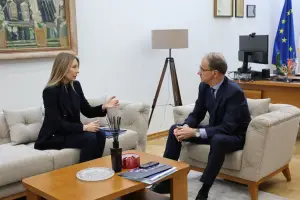Q:
A:
Serbia will meet obligations of Constitutional Charter
Belgrade/Brussels,
16 December 2004
Serbian Prime Minister Vojislav Kostunica said following a meeting with EU High Representative for Common Foreign and Security Policy Javier Solana that Serbia will meet all its obligations under the Constitutional Charter [of the State Union of Serbia and Montenegro] in order to reiterate its European orientation and he expressed hope that Montenegro will fulfil its own obligations as well.
Kostunica told reporters in Brussels that most of today’s meeting dealt with the state union and the implementation of the section of the Constitutional Charter that relates to the direct election of deputies to the joint parliament.
Recalling that this was the issue discussed at a recent meeting of the European Integration Council in Belgrade, Kostunica announced another such meeting to discuss differences between Serbia and Montenegro when it comes to the election of deputies to the joint legislature.
He said that the Serbian parliament should pass a bill on direct elections for the joint parliament, which he said is required by the Constitutional Charter and the 2002 Belgrade Accord, backed by the EU and signed by Solana.
Kostunica stressed the need for the “other side” to pass such law as well and added that Serbia’s and Montenegro’s officials have talked several times on the possibility of holding elections after a referendum on independence.
Belgrade’s stand is that elections must not be delayed or avoided, said Kostunica, adding that they are a pre-requisite for organizing the referendum.
Elections may also be held earlier than that, said Kostunica and noted that “this solution, which is rather extraordinary, is based on a series of talks and concessions made by Belgrade two years ago,” namely that the first elections are indirect and that direct polls are held two years later.
Asked whether Serbia would accept a solution for Montenegro to hold indirect elections and Serbia to hold direct elections, Kostunica said that such an agreement would represent a violation of the constitution.
According to him, as early as tomorrow the Serbian parliament will show that Belgrade will not endorse a compromise that would violate the Constitutional Charter, as the bill on direct election of deputies will be backed by all Serbian parliamentary parties.
Asked what the EU and Solana’s stands on this issue are, Kostunica said that they are trying to find a political solution to this problem.
“If it were possible to settle political disputes without law, things would be very simple. But when problems become the most complicated and hardest to resolve, the law is the final arbitrator. In this particular case, that arbitrator is the Constitutional Charter, not least because the EU is firmly behind the Belgrade Accord,” said Kostunica.
Speaking about cooperation with The Hague tribunal, Kostunica said he expects new voluntary surrenders of indictees and added that Solana had expressed satisfaction with the fact that cooperation with The Hague exists, and that it is a “two-way” cooperation, just as the Serbian government had called for all along.
According to him, two people went to The Hague on their own will and other two were released pending trial, a development that should accelerate Serbia’s cooperation with The Hague tribunal.
Today’s talks also covered the feasibility study, due to be completed in early spring 2005, said Kostunica and expressed the hope that all the problems standing in the way to a positive assessment will be resolved, including the cooperation with The Hague.
Kostunica also said that yesterday’s decision by the International Court of Justice not to hear a suit by Serbia-Montenegro against NATO-countries creates an opportunity for Serbia-Montenegro when it comes to suits by Bosnia-Herzegovina and Croatia against the state union.
Recalling that this was the issue discussed at a recent meeting of the European Integration Council in Belgrade, Kostunica announced another such meeting to discuss differences between Serbia and Montenegro when it comes to the election of deputies to the joint legislature.
He said that the Serbian parliament should pass a bill on direct elections for the joint parliament, which he said is required by the Constitutional Charter and the 2002 Belgrade Accord, backed by the EU and signed by Solana.
Kostunica stressed the need for the “other side” to pass such law as well and added that Serbia’s and Montenegro’s officials have talked several times on the possibility of holding elections after a referendum on independence.
Belgrade’s stand is that elections must not be delayed or avoided, said Kostunica, adding that they are a pre-requisite for organizing the referendum.
Elections may also be held earlier than that, said Kostunica and noted that “this solution, which is rather extraordinary, is based on a series of talks and concessions made by Belgrade two years ago,” namely that the first elections are indirect and that direct polls are held two years later.
Asked whether Serbia would accept a solution for Montenegro to hold indirect elections and Serbia to hold direct elections, Kostunica said that such an agreement would represent a violation of the constitution.
According to him, as early as tomorrow the Serbian parliament will show that Belgrade will not endorse a compromise that would violate the Constitutional Charter, as the bill on direct election of deputies will be backed by all Serbian parliamentary parties.
Asked what the EU and Solana’s stands on this issue are, Kostunica said that they are trying to find a political solution to this problem.
“If it were possible to settle political disputes without law, things would be very simple. But when problems become the most complicated and hardest to resolve, the law is the final arbitrator. In this particular case, that arbitrator is the Constitutional Charter, not least because the EU is firmly behind the Belgrade Accord,” said Kostunica.
Speaking about cooperation with The Hague tribunal, Kostunica said he expects new voluntary surrenders of indictees and added that Solana had expressed satisfaction with the fact that cooperation with The Hague exists, and that it is a “two-way” cooperation, just as the Serbian government had called for all along.
According to him, two people went to The Hague on their own will and other two were released pending trial, a development that should accelerate Serbia’s cooperation with The Hague tribunal.
Today’s talks also covered the feasibility study, due to be completed in early spring 2005, said Kostunica and expressed the hope that all the problems standing in the way to a positive assessment will be resolved, including the cooperation with The Hague.
Kostunica also said that yesterday’s decision by the International Court of Justice not to hear a suit by Serbia-Montenegro against NATO-countries creates an opportunity for Serbia-Montenegro when it comes to suits by Bosnia-Herzegovina and Croatia against the state union.

